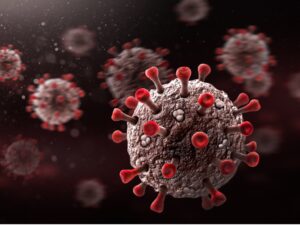
This article is part of our series on Challenges to the Rule of Law in Times of Crisis. Read the series introduction at this link.
Likely since the creation of the concept of human rights, and certainly in its modern understanding that emerged after the devastation of World War II, protection of human rights has continuously found itself at odds with the security priorities that many scholars would argue are at the centre of what a state is, and what underlies the social contract between citizen and government. Namely, it is easier to ensure strong security for the citizens of a state if they are permitted fewer freedoms, but these freedoms are foundational to many modern – and in particular liberal democratic – states. The COVID-19 pandemic has done much more than complicate our personal and professional lives; it has had a profound impact on our identity as members of a society, and on the social fabric that keeps communities together, precisely because it has intensified this clash of rights and security.
The International Center for Not-for-Profit Law (ICNL), with research support from the UN Special Rapporteur Fionnuala Ní Aoláin[1], have developed the COVID-19 Civic Freedom Tracker. This tracker notes that states of exception, or states of emergency, have been applied in 107 countries due to the pandemic, while 56 countries have enacted measures that affect freedom of expression, 139 countries have enacted measures that affect freedom of assembly, and 59 countries have enacted measures that affect privacy. 31 countries have measures formally enhancing militarization, including through enforcement of public health measures, while many others are de facto using their militaries or increasingly militarized police, in many places hired as a surge force, to enforce measures and in some places to assist with vaccine distribution logistics.
Indeed, in its COVID-19 Guidelines for Law Enforcement, INTERPOL notes not only the significant role of the police in managing this pandemic and addressing a possible increase in criminality, but also highlights the importance of ensuring “the centrality of human rights in shaping the pandemic response” for law enforcement. It notes that the pandemic has led to the adoption and use of “exceptional measures limiting or suspending the full and effective exercise of certain fundamental human rights”, among these freedom of movement and freedom of peaceful assembly. These exceptional measures, according to INTERPOL, are purely taken for the purpose of emergency response, and protecting societal health and well-being.
However, the reality that is emerging is a more threatening one to many societies. Ní Aoláin explains the risk of this intensified securitization and of a generalized adoption of these exceptional measures: that “states and security sector institutions will find emergency powers attractive because they offer shortcuts, and that such powers will, therefore, tend to persist and become permanent.” UN Secretary General António Guterres in fact calls this a “pandemic of human rights abuses”. To be clear, these rights are not a question of the staggering egotism of the anti-mask movement. This is a question of gender equality, in which women are leaving the workforce in huge numbers compared to men, primarily due to lack of support for child care, and which has seen domestic violence against women and girls skyrocket. This is a question of income inequality and poverty, not least as evidenced by vaccine distribution, in which just “10 countries have administered more than 75% of all Covid-19 vaccines. Meanwhile, more than 130 countries have not received a single dose.” (Guterres, as of February 2021) – an inequality that could prolong both the pandemic as well as economic recovery. And, critically, “the virus has been used as a pretext in many countries to crush dissent, criminalise freedoms and silence reporting” (Guterres), all in the name of security. Human rights defenders, journalists, lawyers, NGO workers, activists, and even medical professionals “have been detained, prosecuted and subjected to intimidation and surveillance for criticising government responses to the pandemic. Pandemic-related restrictions have been used to subvert electoral processes and weaken opposition voices.” (Guterres)
Of course, to ensure the security – in this case, the health, or human security – of citizens, and to manage public health resources and capacity, some restrictive measures are inevitable to mitigate the risk and potential damage of this pandemic. Even under normal circumstances, human rights necessarily are subject to certain lawful restrictions, in order to respect the rights of others, and public order and health more generally. However, in this context of information manipulation, suppressed freedoms, and the primacy of security, it should perhaps be of no surprise that what has also emerged is increased resistance: protests around key political and social issues have emerged globally and with great force and intensity during a time when a majority of governments are trying to limit, among other rights, freedom of assembly. Some of these protests relate to inequalities arising from the pandemic itself – as King’s College London Professor Funmi Olonisakin argues, in countries where people have experienced great inequality as a result of COVID-19, vocal dissent is “on the rise, and it creates a transnational pattern.” In addition, protests have also emerged in many countries protesting prolonged COVID-19 movement restrictions or pandemic mismanagement.
But other protests, that in many cases are powerful and far-reaching, concern fundamental social and political issues that have crystallised or reached a peak in tension during the pandemic: the Black Lives Matter movement in the U.S., pro-democracy protests in Hong Kong; farmer protests in India; protests against violence against women and sexual assault in Spain, Chile, and the UK; Lebanon’s protests responding to compounding crises; the popular struggle against the military coup in Myanmar; protests against political instability in Peru. Across the world, these all have a key characteristic in common – resistance against violent abuse of power and suppression of freedoms. Even if the pandemic did not start these movements, they have been intensified during this time. This finding is supported by ACLED[2]’s special coverage of COVID-19 Disorder, which has seen an overall increase in demonstrations in 2020 relative to the previous year, and found that “overall, state repression increased around the world” due to the pandemic.
In parallel, others are capitalizing on the social fragmentation resulting from the socio-political issues and inequalities described above – as seen during the Capitol riots on 6 January, where “extremists – including white supremacists and neo-Nazis – have exploited the pandemic to boost their ranks through social polarisation and political and cultural manipulation” (Guterres). All the while, countries like Germany, Argentina, Canada, and Portugal have encouraged (anonymous) citizen denunciation of those breaking COVID-19 restrictions, which will do nothing to improve social and community relations. Conflicts globally have barely if at all been affected, according to the International Crisis Group. At the domestic level, however, “The pandemic has tended to aggravate precisely the factors that were feeding discontent beforehand. In many countries, inequality is more extreme than ever. Living costs are rising. Public resources are scarcer. Middle classes are squeezed. Opportunities for young people, who’ve often sacrificed the most during lockdowns, are fewer. It’s easy to see populists thriving and storms ahead” (ICG). Indeed, Robert Malley, the former President of ICG and current U.S. Envoy to Iran, argues that “if the benefits of the recovery are not more equitably spread out, we are going to go into a much darker period yet”. He warns that if leaders do not try to understand the reasons for the emergence of populism, nativism, and xenophobia that intensified prior to the pandemic, and if recovery strategies do not take these factors into account, then these are going to return “with even greater intensity” in the post-pandemic world. This would present a great threat not just to political orders, but to social ones as well.
And so, while many are already bracing for the expected global economic downturn that may follow the pandemic, we should also be concerned about our state-society relations and, perhaps inevitably, prepare for a renegotiation of our social contract between citizen and government. As Olonisakin argues, the disruption created by COVID is a necessary and welcome opportunity for some leaders, countries, and societies to “rethink their relationships”. The social fabric of many states has been damaged, not just through social isolation and rising discontent, and those that would capitalize upon that polarization, but also through a state-supported fostering of distrust between citizens during this time. In the global prioritization of security during the pandemic, fundamental human rights have been strained, and the way that we view social contact and relationships have been radically altered as we have experienced what Federica Mogherini calls “unforeseeable circumstances, unimaginable for any of us just one year ago.” We must work to ensure that these will not cause lasting damage to the foundation of liberal democratic societies, or cause a slide back to greater repression in places where any gains in rights have been fraught and hard-won. This is especially true as we can now expect new, deadlier pandemics with greater frequency, if significant global environmental and economic reforms, reflecting more equitable economic priorities, are not urgently carried out.
[1] Fionnuala Ní Aoláin’s full title is UN Special Rapporteur on the promotion and protection of human rights and fundamental freedoms while countering terrorism
[2] ACLED is The Armed Conflict Location & Event Data Project
